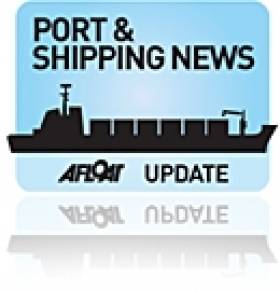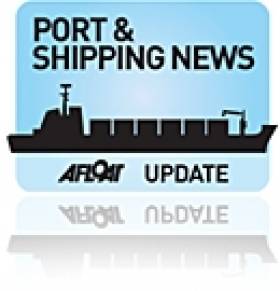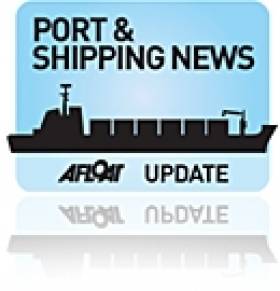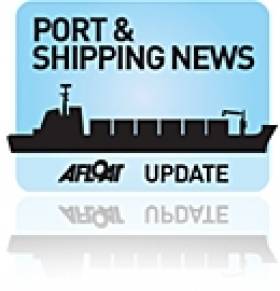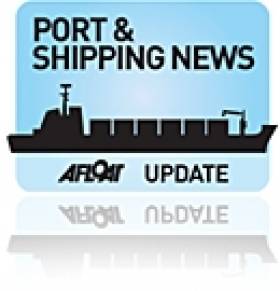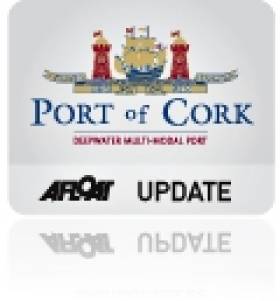Displaying items by tag: Maersk Line
#MaerskBananaBoats – The excellent high adrenaline Oscar nominated film 'Captain Phillips' about the pirated containership Maersk Alabama (1998/14,120grt), saw a fleetmate of the US flagged vessel dock to unload bananas in the Port of Cork, writes Jehan Ashmore.
The Maersk Norfolk (2006/26,671grt) berthed at Ringaskiddy Deepwater Terminal and as previously reported on Afloat.ie, Maersk Line launched the liner service just more than a year ago in February 2013. Then the inaugural caller was made by Maersk Nolanville (2004/26,833grt) and she became the first such 'banana-boat' to trade to Cork Harbour since the 1970's. She was one of the largest vessels of her type to berth at the lower Cork Harbour terminal.
The liner service is operated by a pool of eight containerships and is the first ever direct service to Ireland by the Maersk Line, Limited (MLL) which is an American company, headquartered in Norfolk, Va. This company are part of the Maersk Group which is controlled by the giant Danish owned A. P. Møller-Mærsk A/S headquartered in Copenhagan.
Maersk Line bring leading banana brands from Central American ports to Europe and Cork being the first port of call, where last month the Port of Cork unveiled plans to redevelop the Ringaskiddy terminal by presenting a 3D Real Simulated Model interactive display and a public consultation.
This latest call to Cork Harbour by Maersk Norfolk involves a liner service starting in Vera Cruz, Mexico and included calls to Costa Rica, Belize, Panama, before reaching the rebel county port.
This evening the 210m Maersk Norfolk is scheduled to depart on the next leg to Tilbury and eventually to Rotterdam.
The Thames Estuary of Tilbury port has been rebranded the London Container Terminal (LCT) in face of its nearest downriver competitor, that is the new 'super-port' of the London Gateway owned by DP World. The state-of-the-art facility is a highly automated deep-sea container port.
#ContainerRates- The World's largest container line, AP Moeller-Maersk A/S said it will pool vessels with its two biggest rivals in an effort to manage overcapacity and raise unprofitable freight rates, according to Bloomberg.
The Danish giant Maersk Line, Mediterranean Shipping Company (MSC) and CMA CGM SA will form a network that will comprise of 255 vessels on 29 loops, the Copenhagen-based shipping line has confirmed.
Together these lines will co-operate on the world's three largest trade lanes: Asia-Europe, trans-Pacific and trans-Atlantic. Container companies including Maersk Line, have said they plan to raise rates next month following the price declines caused by overcapacity.
The Shanghai Containerised Freight Index, a measure of box rates out of China, has dropped 21% in the last three months as industry efforts to boost prices earlier this year failed to yield results.
"We're joining forces after experiencing virtually no growth in these tree trade lanes since the financial crisis in 2008," Maersk Line chief trading and marketing officer Vincent Clerc said.
Ports & Shipping Review: Ardmore Name Tankers, Maersk Opt for Suez, Ireland’s Globalised Status, Short-Sea ‘Steady’ and Last Guinness Tanks
#ShippingReview – Over the last fortnight, Jehan Ashmore has reported from the shipping scene, where Cork based Ardmore Shipping named two of their latest newbuild product chemicals tankers at a South Korean shipyard.
According to the IMDO's Weekly Shipping Market Review, Maersk Line, is looking to change its path for the trade lane of Asia to US East Coast, by opting for the Suez Canal as opposed to the current Panama Canal.
In addition the IMDO review reports that Ireland has been ranked the world's third most globalised economy in terms of GDP, and the most globalised nation in the western world, according to Ernst and Young. As for the European Short Sea Market, this has been summarised as "steady/flat", according to HC Shipping & Chartering".
The cargsoship Blue Tune (2010/3,845grt) which currently is docked in Dun Laoghaire Harbour, is understood to have arrived with the final batch of fermentation tanks bound for the Guinness brewery plant in Dublin.
IMDO Shipping Review: Maersk Re-Route Via Suez, Dry-Bulk Momentum, Ireland Ranked 3rd in Globalised Economy and more…
#Ports&Shipping -The latest IMDO Weekly Shipping Market Review reports that the world's largest container shipping line, Maersk Line, is looking to change its path for the trade lane of Asia to US East Coast, by opting for the Suez Canal as opposed to the current Panama Canal.
The re-routing is to take advantage of economies of scale, as Maersk will be able to send a vessel through the Suez Canal that can carry up to 9,000 TEU containers, which would be more cost-effective than sending two 4,500 TEU vessels through the Panama Canal.
Dry Bulk Market: On the back of increased cargo availability, the dry bulk market has maintained its rising momentum. The steady increase is illustrated in the weekly rise in the industry's benchmark, Baltic Dry Index (BDI), finishing at 872, up from 818 the previous week.
Short Sea Shipping: In the European Short Sea Market, as with most weeks lately, can be summarised as "steady/flat", according to HC Shipping & Chartering". However, this week highlighted the abundance of spot tonnage slightly more than most weeks, along with owner's eagerness to cover positions becoming more evident.
Irish Economy: Globalization Ireland has been ranked the world's third most globalised economy in terms of GDP, and the most globalised nation in the western world, according to a new index published by Ernst and Young. The index is measured by a country's openness to trade, movement of capital, exchange of technology and ideas, labour movements, and cu ltural integration. Ireland finished third behind Hong Kong and Singapore, but ahead of Switzerland, Sweden, Denmark, Belgium and the UK.
To read more and other stories, they can be viewed or downloaded as a PDF from the IMDO Shipping Markets Review for Week 11.
More Bananas Head for Cork
#PORTS & SHIPPING – As previously reported on Afloat.ie Maersk Line's newly launched liner service that includes the return of the banana trade to the Port of Cork continues as another shipment is due from Central America /Caribbean ports with the arrival of Nedlloyd Adriana (photo) tomorrow, writes Jehan Ashmore.
Nedlloyd Adriana (2003/ 26,833grt) is a younger sister of Maersk Nolanville (2004/26,833grt) which previously docked at the Ringaskiddy Deepwater Berth as part of the services weekly call. Onboard the 2,500 (TEU) twenty equivalent unit capacity containerships, they include 800 (reefer points) i.e electrically plugged in refrigerated containers to store perishable products.
Noting the cargo deck arrangement is divided by the superstructure, which in vessel design terms is not unusual, but is not normally seen in Irish waters due to this larger sized containership. She is fitted with three deck-mounted cranes positioned forward of the bridge and a single-aft crane to cater for the smaller cargo-deck astern.
The vessel was built in South Korea by Hyundai Heavy Industries in Ulsan and was launched as Adriana Star. She was later renamed P&O Nedlloyd Adriana until dropping her operators prefix in 2004.
When the vessel has completed operations in Ringaskiddy, she heads to UK and continental ports to complete the liner service which is served in total by a pool of eight similar sized vessels.
The term 'liner' service refers to a dedicated regularly operated network of long-distance routes across oceans that connect ports between the continents.
The liner service is complemented by an onward internal network of short-seas routes known as 'feeder' services and use smaller containerships such as Vega Stockholm (photo) which calls to Dublin Port (see BBC The 'Box') as previously reported on Afloat.ie
As in the case of the Maersk Line liner service which brings bananas from source directly to Cork, there is no requirement to transfer such cargo by feeder vessel from another port in the UK or mainland Europe.
The 'Banana' Trade Returns to Cork
#PORT OF CORK – Global shipping giant Maersk Line recently started their first ever direct service to Ireland with a new liner service calling to the Port of Cork and sees the return of the 'banana' trade not last seen in port since the 1970's, writes Jehan Ashmore.
The older 'banana' boats or reefers that used to serve Cork may be long gone but the Danish owned Maersk Line will be operating an impressive pool of eight large contiainerships. They will bring leading banana brands from Central American ports to Europe with Cork being the first port of call in Europe. The liner service starts in the Mexican port of Vera Cruz and includes calls to Costa Rica, Belize, Panama before reaching Cork.
One of the vessels Maersk Nolanville (2004/26,833grt) last week docked in Ringaskiddy Deepwater Terminal, is one of the largest of her type to be accommodated in the port. At 700m long, a beam over 30m and drawing a draft exceeding 10m the South Korean built vessel was too large to berth at the ports Tivoli Container Terminal further upriver on the Lee.
Maersk Nolanville and her fleet-mates will operate with a weekly call to Cork on Thursdays, where quayside cranes in Ringaskiddy will handle the 2,500 (TEU) capacity vessels including around 800 refrigerated containers containing perishable tropical fruits.
Asides bananas the vessels will import other cargoes, with the containerships also calling to Tilbury in the UK and Rotterdam and with exports on the return leg of the long trans-Atlantic voyage home.


























